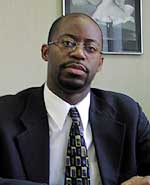By Elizabeth Stawicki
Minnesota Public Radio
October 15, 2002
Hennepin County prosecutors are encouraging judges to bar some convicted drug dealers from the Minneapolis neighborhoods where they committed their crimes. The action is a response to citizens and police who say some areas of the city are besieged by drug dealers.
| |
|
|
|
||
Minneapolis police have mapped out three specific areas in Minneapolis where drug use and sales are rampant, and where citizen complaints are high -- Bloomington Ave., the corner of Chicago and Lake, and the corner of Chicago and Franklin Ave.
Hennepin County prosecutor Gail Baez heads the county's drug prosecution team. She and other prosecutors are asking judges to order some drug offenders who committed crimes in those areas not to return.
"I like to think of this as one way where we can get before the court that we must be very concerned about the people who live in the neighborhoods, not just about the welfare of the particular individual," Baez says. "That's important, but it's equally as important for the people living in the neighborhoods and the rights of those people."
Baez is currently prosecuting the case of Illys Tony Gilmore. Minneapolis police have arrested Gilmore 137 times in the past eight years. In the past three years alone, police have arrested him in and around the Chicago-Franklin area 13 times. In May, he pleaded guilty to selling fake crack cocaine.
Judge John Sommerville ordered Gilmore to stay out of an 11-square block area around Chicago, Franklin and Lake Streets as a condition of probation for the next 2 1/2 years. Gilmore ripped up the judge's order.
| |
|
|
|
||
"The Constitution says the people have rights," Gilmore says. "And that's why I feel like I have a right to be where I want to be and go where I want to go."
Gilmore says he returned to the neighborhood to stand up for his rights. He was promptly arrested and is now being held in the Hennepin County jail.
"I believe that this restriction thing is a new type of Jim Crow law and a new kind of segregation," says Gilmore. "It means they're separating African-Americans from people in neighborhoods, and that's wrong."
The right to move freely in the U.S. is a fundamental right. And even though judges have broad discretion in setting probation conditions, those conditions must be reasonably related to rehabilitating the offender while preserving public safety.
Prosecutor Gail Baez says keeping someone like Gilmore from an area of town where he may be more tempted to use or sell drugs is as good for him as it is for the neighborhood.
"There are many such conditions we put on people, under the belief that maybe someone is more likely to stay out of trouble if they have a job -- the courts sometimes order people to get a job," Baez says. "If it's a child molester, very often they will say you can't have contact with children."
|
"I believe that this restriction thing is a new type of Jim Crow law and a new kind of segregation. It means they're separating African-Americans from people in neighborhoods, and that's wrong." - Illys Tony Gilmore, drug dealer ordered to stay away from troubled area
|
But Gilmore's attorney Todderick Barnette says keeping Gilmore from one area of town doesn't guarantee he can't use drugs elsewhere.
"Just because a person gets a speeding ticket on Hennepin and they get another speeding ticket on Hennepin, are we going to tell them, 'Now you're restricted from driving down Hennepin Avenue?' No. You can drive down any street," says Barnette. "And I say that because it's Mr. Gilmore, it doesn't make a difference. You restrict him from these areas, he can still go someplace else."
Two years ago, the Minnesota Supreme Court overruled a Hennepin County judge who barred an offender from the entire city of Minneapolis as a condition of probation. The state Supreme Court said the condition potentionally infringed on the probationer's fundamental rights, when the judge had only identified a single apartment complex as a problem site.
Barnette says excluding Gilmore from certain neighborhoods is also vague.
"It's not as if he was in, say, a Target store, and stole something. And then you could say, 'You can't go into this particular Target store anymore,'" Barnette says.
Illys Tony Gilmore is scheduled to go before Judge Sommerville Oct. 16. The prosecution is expected to ask the judge to revoke Gilmore's probation, since Gilmore has refused to follow the judge's order to stay out of the Chicago-Franklin neighborhood.
More from MPR

